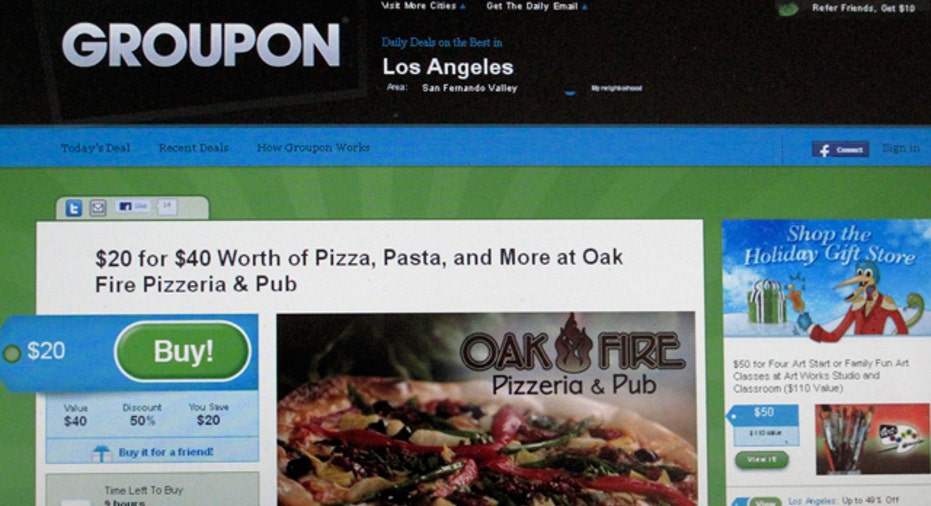Can't Use Your Groupon Coupon? Deal Wallet Can Help

DealsGoRound's just launched a feature that could transform how we use daily deals services: Its new Deal Wallet is a system to organize all the deals you buy from different providers like Groupon or LivingSocial in one place, so that you're aware of which ones you've bought and when they're valid. But here's the trick--it also lets you sell ones that you can't use, at a price that you chose. Think about that for a moment, and you'll see how powerful an idea it is.
DealsGoRound has been in business since early 2010, and calls itself the "leading secondary marketplace and personal daily deal organizer for consumers." Kris Petersen, the company's founder and CEO, explained to Fast Company that the whole idea was born from experiences he and some friends have had when they couldn't use a daily deal coupon in time--due to an injury which prevented sporting activities, a calendar conflict, or something else. Petersen personally lost $180 on a Segway tour of Chicago that he couldn't use.
Voila--DealsGoRound, which acts as a clearing house for coupons you no longer want or can't use. Essentially it's a way to gain back some of your investment, which you may have even made over-enthusiastically in the first place (Groupon can be wonderful, but who among us has not felt coupon remorse?). Within 12 hours of launching the site, there were users already selling coupons.
But as the daily deals phenomenon has grown explosively, so has the potential for thinking differently about coupons in a secondary market. And that's where the Deal Wallet fits in. The company's press release says it's a way to centralize all your different coupons--which consumers were otherwise "left tracking [...] on a spreadsheet or not at all; often leading to forgetting about deals they had purchased." The Deal Wallet is a secure, cross-platform system that keeps all the unique voucher codes and certificate files "nicely organized" and includes a weekly email update to its users to remind them that a coupon's due to expire. It's web-based at launch, but iPhone and Android apps are due imminently.
And that's where things get interesting. Imagine you managed to snag one of the limited coupons for money off a meal at a hot-ticket new restaurant in town, but get called away on business at the last minute. You'd open up the Wallet app, where you've got all the deal details electronically stored, and offer the coupon on DealsGoRound's marketplace. Then someone else who'd missed the original offer could buy the coupon at the last minute and enjoy the special deal. You get your money back, they get a meal, the provider gets good PR (from the original coupon offer), DealsGoRound gets 10% of the sale price and everyone's happy.
And there's another use-case to think about: Coupons and daily deals are usually sold well in advance of when you want to use them. But we've all been paying for a good or service, only to spot someone else handing over a coupon to pay less than we are. What if you scouted through the Deal Wallet's marketplace to see if there was a coupon on sale from someone else that can't use it, right before you were about to commit to a purchase yourself? Petersen suggests "you can actually be in a restaurant eating dinner, and have a light bulb go off, thinking 'there was a LivingSocial deal for this restaurant a few weeks ago' and then you'd pull up the Wallet app, do a search by location, find someone selling that deal, buy the deal and redeem it all before your desert."
There's potential here to disrupt the already disruptive daily deals system here. Petersen notes that from a deal provider like Groupon's point of view, the Wallet actually "enhances their value proposition" since "consumers are buying more because they have a way out--they have a back-up plan for a 'way out' of the deal"--spurring more speculative purchases of deals in the first place. It also messes with the one-to-one relationship clients have with a site like Groupon, and makes consumers think of coupons in the bigger sense as a service they can manage as a whole and even sell-on, no matter what provider they bought them from.
And there's another wrinkle: Petersen notes that right now people tend to "sell their deal for what they paid for them" in the first place. But it's a "true marketplace" so there's no reason, if it's a really hot restaurant, that you couldn't sell your coupon at a slight profit.
This content was originally published on FastCompany.com
 More news from Fast Company: - Ticketmaster: Rocking The Most Hated Brand In America - Can Matt Damon Bring Clean Water To Africa? - The Case For Test-Tube Steaks: Harvesting Artificial Meat Would Save Tons Of Energy
More news from Fast Company: - Ticketmaster: Rocking The Most Hated Brand In America - Can Matt Damon Bring Clean Water To Africa? - The Case For Test-Tube Steaks: Harvesting Artificial Meat Would Save Tons Of Energy



















